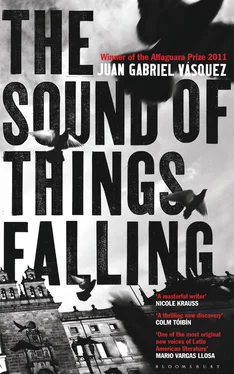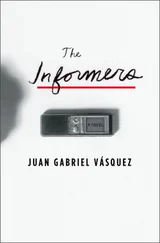A doctor came to explain the uses of the trigger I had in my hand: when I felt too much pain, he told me, I could press the button, and a spurt of intravenous morphine would soothe me immediately. But there were limits. The first day I used up my daily dose in a third of the time (I pressed the button like a child with a new video game), and the hours that followed are, in my memory, the closest I’ve been to hell. I’m telling this because that’s how, between the hallucinations of the pain and those of the morphine, the days of my recovery went by. I fell asleep at any moment, without any apparent routine, like prisoners in stories; I opened my eyes to a landscape that was always strange, the most curious characteristic of which was that it never became familiar, I always seemed to be seeing it for the first time. At some moment I can’t manage to pinpoint, Aura appeared in that landscape, sitting there on the brown sofa when I opened my eyes, looking at me with genuine pity. It was a new sensation (or it was new to be looked at and cared for by a woman who was expecting my child), but I don’t recall having thought so at the time.
The nights. I remember the nights. The fear of the darkness began in those last days of my hospitalization, and only disappeared a year later: at six thirty in the evening, when night falls suddenly in Bogotá, my heart began to beat furiously, and at first it took the dialectic efforts of several doctors to convince me that I wasn’t about to die of a heart attack. The long Bogotá night — it always lasts more than eleven hours, no matter the time of year and much less the mental state of those who suffer it — seemed almost unendurable to me in the hospital, with its nocturnal life marked by the permanently illuminated white corridors, by the neon gloom of the white rooms; but in the bedroom of my apartment the darkness was total, for the streetlights didn’t reach my tenth floor, and the terror I felt at just imagining myself waking up in the dark obliged me to sleep with the light on, as I did when I was little. Aura put up with the illuminated nights better than I would have expected, sometimes resorting to those masks they give you on planes to create a personal darkness, sometimes giving up and turning on the television to watch an infomercial and amuse herself with machines that chop all kinds of fruit and lotions that dissolve all body fat. Her own body, of course, was transforming; a little girl called Leticia was growing in there, but I wasn’t capable of giving her the attention she deserved. I was woken up on several nights by an absurd nightmare: I’d gone back to live at my parents’ house, but with Aura, and suddenly the gas stove blew up and the whole family was dying and I realized there was nothing I could do. And, no matter what time it was, I ended up phoning my old house, just to make sure nothing had happened in reality and that the dream was just a dream. Aura tried to calm me down. She stared at me, I could feel her looking at me. ‘It’s nothing,’ I told her. And only at the end of the night would I manage to sleep for a few hours, coiled up like a dog frightened by fireworks, wondering why Leticia wasn’t in the dream, what had Leticia done to be banished from the dream.
In my memory, the months that followed were a time of large fears and small discomforts. On the street I was assailed by the unmistakable certainty I was being watched; the internal injuries caused by the bullet wound forced me to use crutches for several months. A pain I’d never felt before appeared in my left leg, similar to what people feel when they’re about to have an appendicitis attack. The doctors told me how slowly nerves grow and the time it takes to recover a certain degree of autonomy, and I listened to them without understanding, or without understanding that they were talking about me; somewhere else, far from where I was, Aura listened to explanations from other doctors on very different subjects, and took folic acid tablets and received cortisone injections to help the baby’s lungs mature (in Aura’s family there was a history of premature deliveries). Her body was changing, but I didn’t notice. Aura put my hand on one side of her prominent belly button. ‘There, there she is. Did you feel?’ ‘But what does it feel like?’ I asked. ‘I don’t know, like a butterfly, like tiny wings brushing against your skin. I don’t know if you understand.’ And I told her I did, that I understood perfectly, although it was a lie.
I didn’t feel anything: I was distracted: the fear distracted me. I imagined the faces of the murderers, hidden behind the visors; the blast of the shots and the continuous whistle in my throbbing eardrums, the sudden apparition of blood. Not even now, as I write, can I manage to remember those details without the same cold fear easing into my body. The fear, in the fantastic language of the therapist who treated me after the first problems, was called post-traumatic stress, and according to him had a lot to do with the era of bombs that had ravaged us a few years earlier. ‘So don’t worry if you have problems of an intimate nature,’ the man told me (he spoke those words, intimate nature ). I didn’t say anything to that. ‘Your body is fighting something serious,’ the doctor continued. ‘It has to concentrate on this and eliminate what isn’t strictly necessary. The libido is the first to go, you see? So don’t worry. Any dysfunction is normal.’ I didn’t respond this time either. Dysfunction : the word seemed ugly to me, its sounds seemed to clash, disfiguring the atmosphere, and I thought I wouldn’t talk about the matter with Aura. The doctor kept talking, there was no way to make him stop talking. Fear was the main ailment of bogotanos of my generation, he told me. My situation, he told me, was not at all unusual: it would eventually pass, as it had passed for all the others who had visited his office. All this he told me. He never managed to comprehend that I wasn’t interested in the rational explanation or much less the statistical aspect of these violent palpitations, or the instantaneous sweating that in another context would have been comical, but in the magic words that would make the sweating and palpitations disappear, the mantra that would allow me to sleep through the night.
I got used to my nocturnal routines: after a noise or the illusion of a noise had frightened me out of sleep (and left me at the mercy of the pain in my leg), I reached for my crutches, went to the living room, sat in the recliner and stayed there, watching the movements of the night on the hills around Bogotá, the green and red lights of planes that could be seen when the sky was clear, the dew accumulating on the windows like a white shadow when the temperature dropped in the early hours. It wasn’t only my nights that were disturbed but my waking hours as well. Months after what happened to Laverde, a backfiring exhaust pipe, a slamming door, or even a heavy book falling in a certain way onto a certain surface would be enough to set me off on an attack of anxiety and paranoia. At any moment, for no discernible reason, I might start to weep inconsolably. The tears would come upon me with no warning: at the dining-room table, in front of my parents or Aura, or with friends, and the feeling of being ill was joined by embarrassment. At first there was always someone who leapt up to hug me, there were the words one uses to comfort a child: ‘It’s all over now, Antonio, there there.’ With time people, my people, got used to these bursts of tears, and the consoling words stopped, and the hugs disappeared, and the embarrassment was then greater, because it was obvious that I, rather than moving them to pity, seemed ridiculous. With strangers, who owed me no loyalty or compassion whatsoever, it was worse. During one of the first classes I taught after going back to work, a student asked me a question about Von Ihering’s theories. ‘Justice,’ I began to say, ‘has a double evolutionary base: the struggle of the individual to have his rights respected and that of the State to impose, among its associates, the necessary order.’ ‘So,’ the student asked me, ‘could we say that the man who reacts, feeling himself threatened or infringed, is the true creator of the law?’ and I was going to tell him of the time when all law was incorporated within religion, those remote times when distinctions between morals and hygiene, public and private, were still non-existent, but I didn’t manage to do so. I covered my eyes with my tie and burst into tears. The class was adjourned. On the way out, I heard the student say, ‘Poor guy. He’s not going to make it.’
Читать дальше












